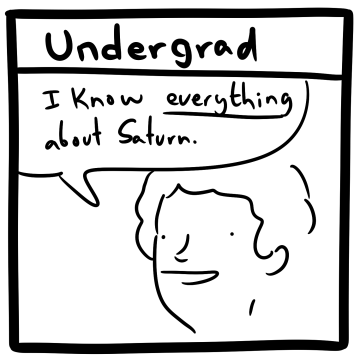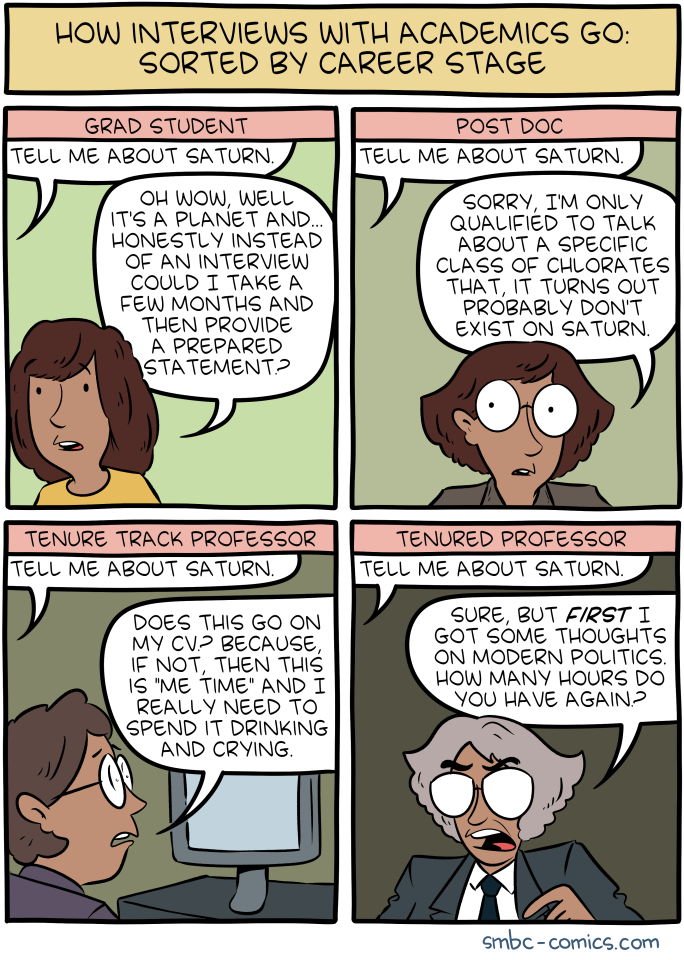Style? Stance? What?
« previous post | next post »
Yesterday's SMBC:
Mouse-over title: "The emeritus will take 4 hours telling you about a trip to Africa that happened 40 years ago."
The aftercomic:

Jokes and stereotypes aside, this comic captures something about different ways of approaching the response to a question. The illustrated choices are all related to speakers' awareness of (and concern for) the probable evaluation of their responses. Other aspects of communicative dynamics could create other sorts of variation.
But what is this kind of variation called? It's related to style — but "style" is broader in some ways and narrower in others. It's related to personality — but the same person could respond in any of these ways in different circumstances.
The closest thing seems to be stance, about which Wikipedia says
In linguistics, stance is the way in which speakers position themselves in relation to the ongoing interaction, in terms of evaluation, intentionality, epistemology or social relations. Different authors have used the concept of stance to refer to the interpretive framework that is at play in an interaction such as irony, or role-playing, others have used the concept of authorial stance to describe the way in which authors position themselves relative to their own texts, and another group have used the concept of interpersonal stance to describe the way the communicative goals of individual participants shape a communicative interaction. Others have drawn on Daniel Dennett's concept of the intentional stance to describe the way humans tend to impute intentions and mental states to those with whom they engage in communication.
But again, stance seems both broader and narrower than what's going on here.

Rick Rubenstein said,
October 28, 2018 @ 4:12 am
Completely unrelated to the content of the comic or the post: I found the choice of a colon after "go" slightly odd, bordering on ungrammatical in my ideolect. I would have used a comma without even thinking about it. (Although making the second clause a parenthetical would also work fine for me.)
Philip Taylor said,
October 28, 2018 @ 4:21 am
Well, it took me some time to find "go:" (no underlying OCR text, I now realise) but having found it, I agree with Rick R.
Don said,
October 28, 2018 @ 11:02 am
While we're talking about weird punctuation in the strip, I was jarred by the lack of a comma after "out" in "chlorates that, it turns out probably don't exist." (But that one seems so clearly wrong, at least to me, that I'd guess the author just forgot to write the comma.)
Michael Watts said,
October 29, 2018 @ 1:17 am
If I were writing it within running text, I would also write "How interviews with academics go, sorted by career stage." (Though that's… a pretty poor sentence. It'd be hard to fit that in running text. You'd need something like "The following is a graph of how interviews with academics go, sorted by career stage.")
But I don't find the comic's title especially odd, because it's a title; to me, it draws on the very standard form Title: subtitle, and the subtitle is properly providing information that helps interpret the title.
BZ said,
October 29, 2018 @ 12:03 pm
It occurs to me that "interview" is ambiguous here. Is this a job interview or the kind conducted by the press? I first assumed the first, but looking over the comic again, it's not so clear, and I'm leaning toward the second.
Part of the confusion is that neither type of interview would include a question like "tell me about Saturn". At a job interview, "describe Saturn" or "tell me about your experience with Saturn" would be more likely. At a reporter's interview the second one would work too, but "tell me about the recent developments involving Saturn" or "tell me about Saturn's new something or other" would also be expected.